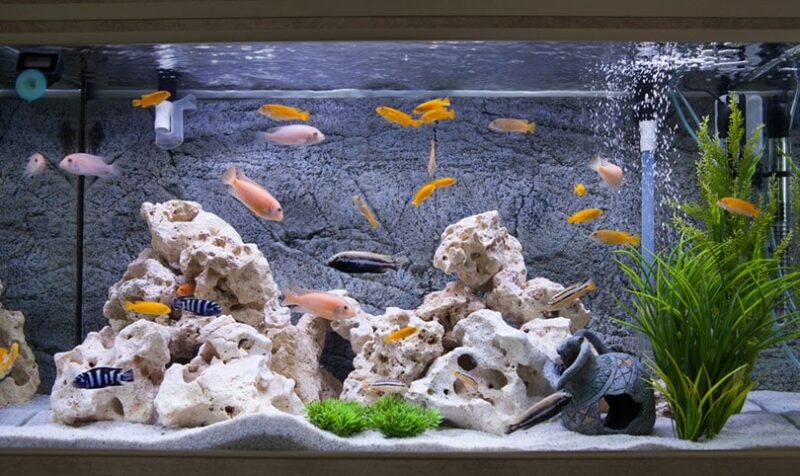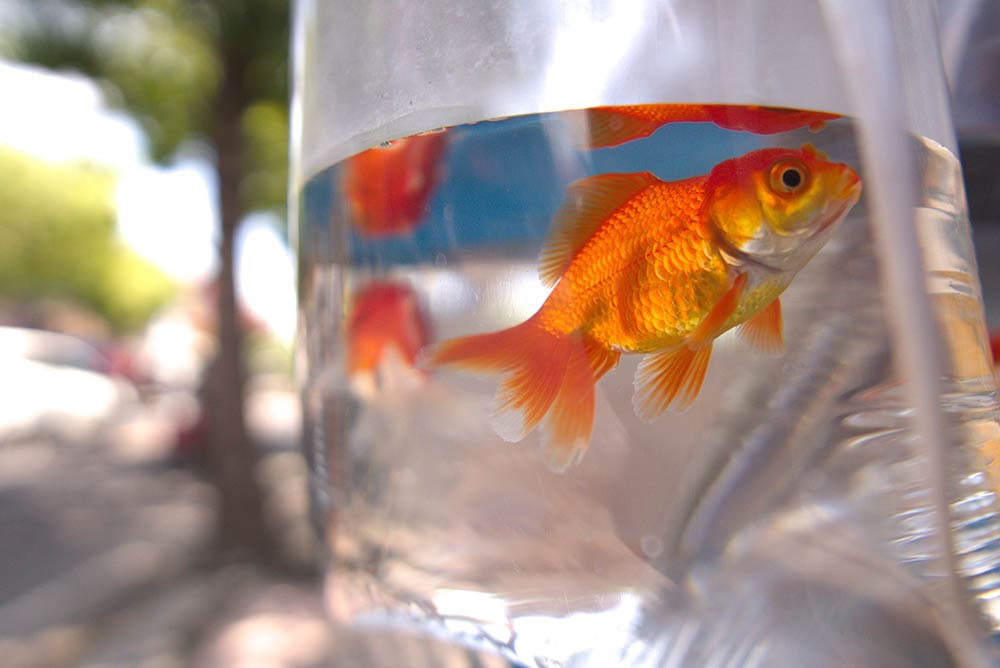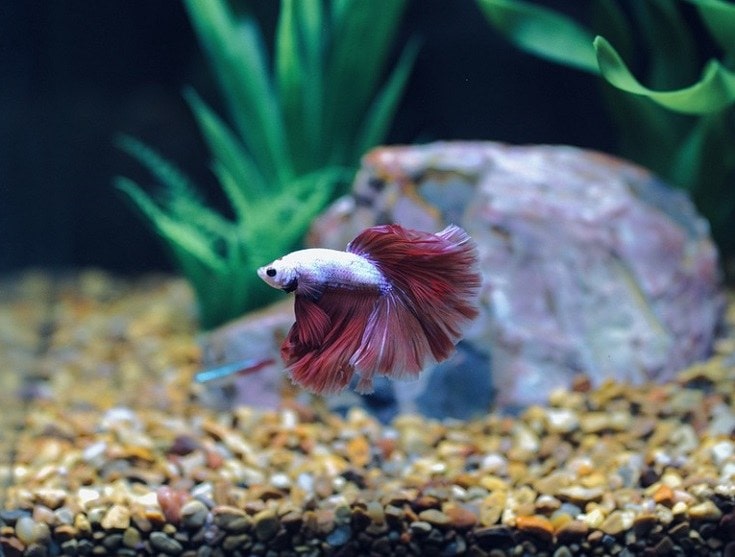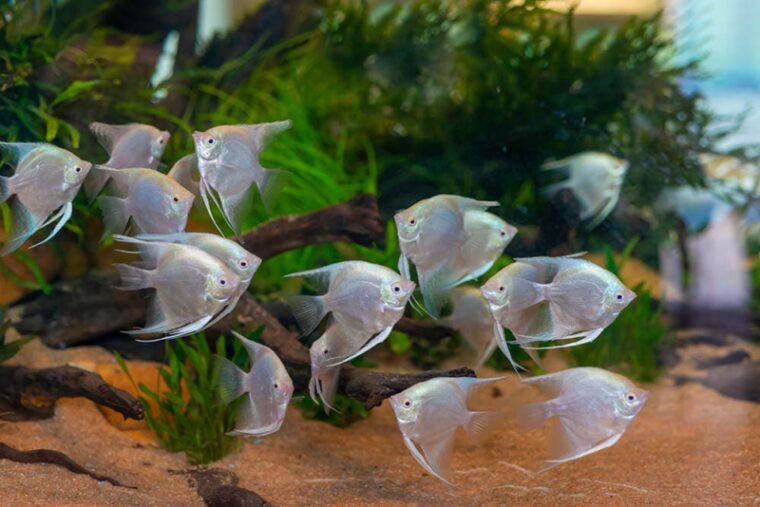
Angelfish are beautiful and fascinating aquarium fish that are available in a variety of different colors, patterns, and sizes. Angelfish make great additions to large tropical aquariums, and their swimming behaviors and appearance make them rewarding fish to own.
When it comes to caring for these fish, there are many myths and misconceptions about these fish that are not true and can be harmful to the longevity of angelfish.
In this article, we will discuss and debunk these myths and misconceptions that surround angelfish and their care.
The 14 Most Common Angelfish Myths & Misconceptions
1. Angelfish Can Be Kept In Small Aquariums
Most types of angelfish can grow quite large, reaching up to 6 or 12 inches in size. You can however get away with keeping the smallest of the P. leopoldi angelfish in a smaller aquarium, as they only grow to around 2 inches inside. The rest of the angelfish species in captivity require much larger aquariums that will need to be upgraded as they grow.
Keeping your angelfish in a larger tank from the start can be beneficial, as it saves you from having to continuously upgrade their aquarium while giving them plenty of space to swim with more room for error when it comes to maintaining the water conditions.

2. Angelfish Do Not Live Very Long
Fish usually get a reputation for not living very long, but this is not true for angelfish. Angelfish have a similar lifespan to a dog, and they can live up to 10 to 15 years of age. Disease, poor water quality, bad genetics, and a low-quality diet can cause your angelfish to die quicker than they were supposed to.
Ensuring that your angelfish are well cared for and treated for disease when they are sick can help your angelfish to live out their full lifespan.
3. Angelfish Do Not Produce a Lot of Waste
Although angelfish are not as messy as goldfish, they still produce a lot of waste in comparison to other species of fish. This makes it important to keep up with regular water changes and aquarium maintenance when caring for angelfish. Ensuring that your angelfish aquarium has a good filtration system is important, as this plays a role in the aquarium’s water quality.
Since angelfish are prone to disease, poor water quality can be detrimental to their health and other aquarium inhabitants, and this biological waste is produced when they eat and poop, which is why a filtration system can help keep the water clean for your angelfish.
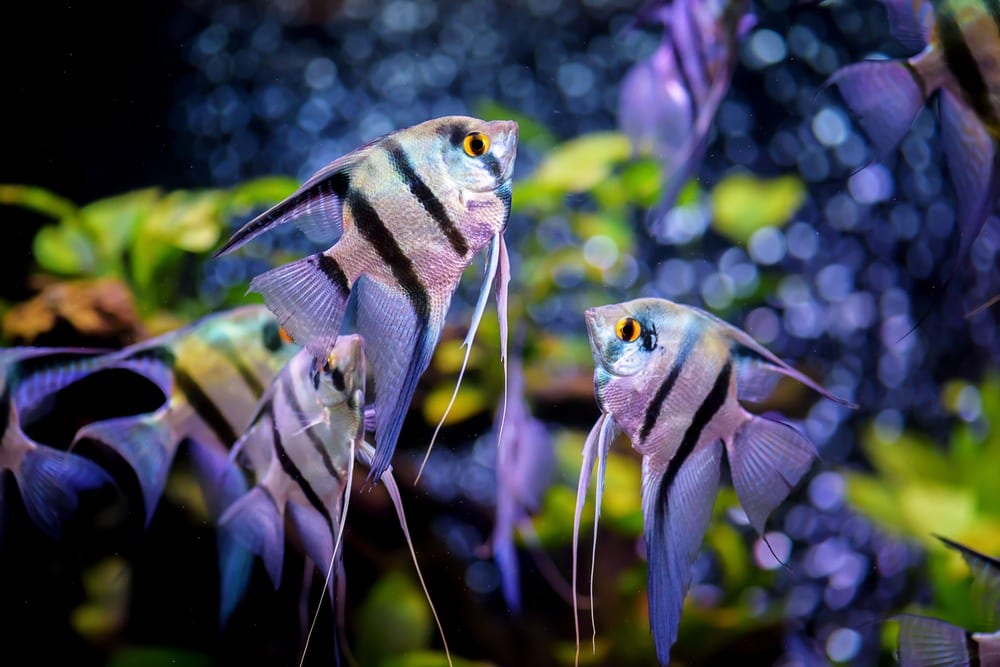
4. Angelfish Are a Good Starter Fish
The angelfish might be a good fish for beginners, but they aren’t great first pet fish. This is because they require more research, and the beginner fish keeper should have a bit of experience in keeping tropical fish first.
Getting angelfish without any previous experience in fish keeping and aquarium maintenance can be challenging, which is why they don’t make good starter fish.
5. Angelfish Are Solitary
As a part of the cichlid fish family, angelfish can be semi-aggressive which can make them poor tank mates for other fish, and sometimes even other angelfish. In the wild, angelfish are seen in pairs or small groups which does not make them solitary fish. Unlike the solitary male betta fish, angelfish can be kept in pairs of other angelfish, and they even prefer it.
You might notice that angelfish become more territorial and aggressive during the breeding season, but this is completely normal for angelfish who are defending their territory and nests with their mate.
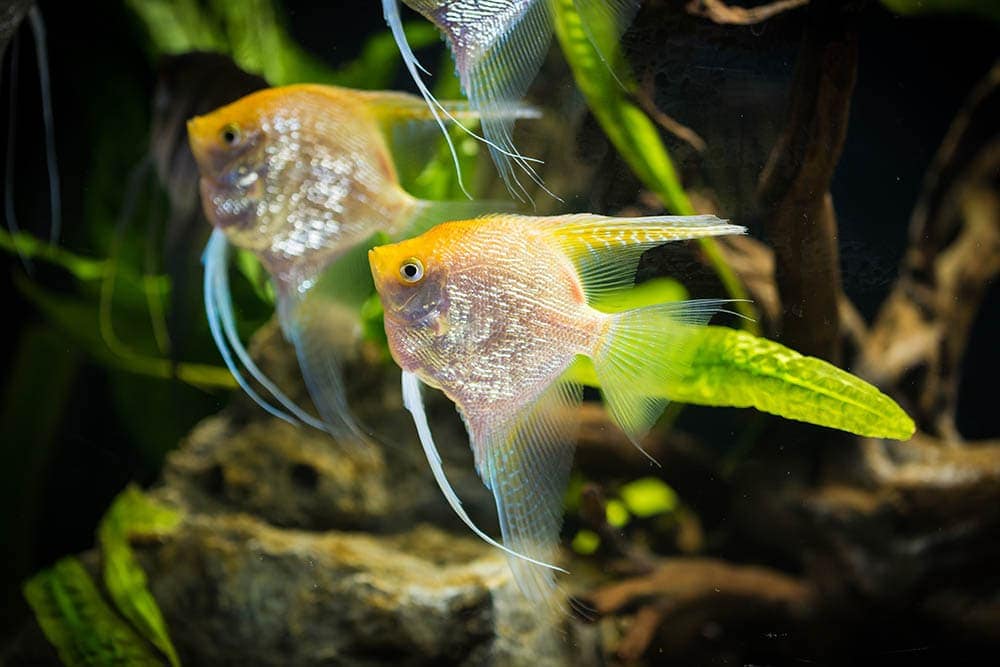
6. They Do Not Need a Heater
Angelfish are tropical fish, which means that they need a heater in their aquarium to maintain a warm stable temperature. Most captive species of angelfish originate from tropical South America in the Amazon basin, where the water is warm and slow-moving.
Replicating the conditions that your angelfish will experience in the wild is important, and it will ensure your angelfish are kept healthy.
While a little bit of cold water for a short period won’t harm your angelfish, keeping them in cold conditions with fluctuating temperatures can lead to disease and poor health, since angelfish feel more comfortable in tropical conditions.
7. Angelfish Fish Don’t Need a Filter
Like all aquarium fish, angelfish require a filter in their aquarium. Aquarium water can quickly become stagnant and dirty without a good filtration system, even if you use a bubbler or another form of aeration. Using a filter in your angelfish aquarium will help keep the water clean and moving, which is essential for a healthy aquarium.
Another reason angelfish need a filter is that they produce a high bio load with all their waste, and a filter will host beneficial bacteria that help keep the water parameters in check.
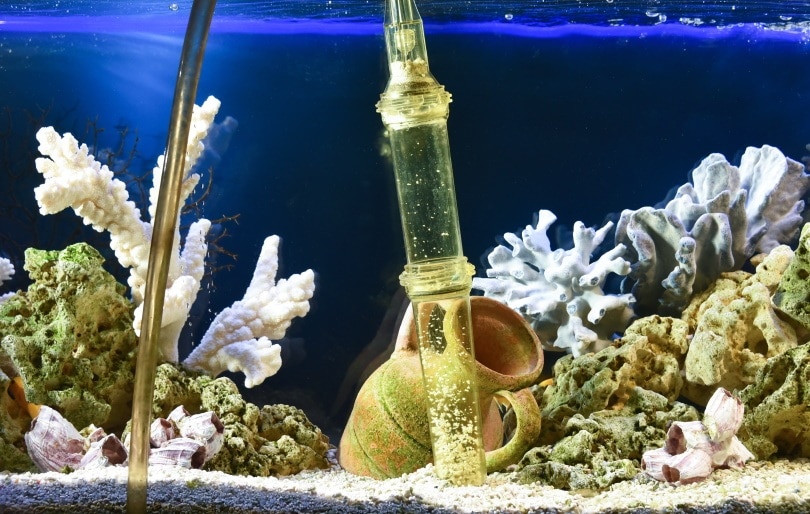
8. Angelfish Can Be Kept with Goldfish
Angelfish and goldfish do not make a good combination, and they should not be kept together in an aquarium. Both types of fish are found in different habitats, meaning their water conditions and temperature requirements are vastly different. Furthermore, angelfish will also bully goldfish, which can cause goldfish to become stressed.
Goldfish do not require a heater and can be kept in temperate waters, while angelfish do need a heater and the aquarium should be kept warmer year-round than what is comfortable for goldfish. There are better tank mate options for angelfish out there than goldfish, and these fish will do better in their tanks either by themselves or with compatible tank mates.
9. They Are Great for Community Tanks
In the wild, angelfish are known for hunting and eating smaller fish such as neon tetras. This means that it shouldn’t be too surprising for an angelfish to start eating other smaller fish in an aquarium that they can fit into their mouths. When choosing tank mates for your angelfish, you should consider the temperament and size of the fish, as smaller fish are seen as food for juvenile and adult angelfish.
The semi-aggressive temperament of the angelfish doesn’t make them a good fish for a community tank with schooling or mid-swimming fish species, but there is an exception for tropical bottom-dwelling tank mates as they should rarely come across each other in an aquarium.

10. Angelfish Are Herbivores
Angelfish are often confused as either herbivores or omnivores that should mostly be fed a plant-based diet. This is not true, as most species of angelfish are naturally carnivores in the wild, preying on small fish, crustaceans, insects, and worms. They will not get all the nutrients they need to grow and stay healthy if you only feed them herbivore food.
Instead, angelfish should be fed a carnivorous commercial food, or they can be fed an omnivorous diet with either live or freeze-dried worms and crustaceans as a supplement.
11. They Do Not Grow Very Large
This misconception about angelfish is typically used to justify keeping angelfish in smaller aquariums, but it is not true for most species of angelfish. Aside from the small P. leopoldi angelfish, angelfish grow quite large. Although angelfish look small when you buy them from a pet store, they will continue to grow until adulthood.
Depending on the species, angelfish can grow up to 12 inches, but most will only reach 8 to 10 inches in captivity. This means that you will need to ensure that the aquarium is large enough to support their size, and the more angelfish you have in one aquarium, the larger it needs to be.

12. Angelfish Are Only Freshwater Fish
While this is true for most captive species of angelfish, certain species of angelfish are marine or saltwater fish. This is why it is important to know the species of angelfish you are keeping in your aquarium, as the angelfish from the Pomacanthidae family are marine and require a higher salinity content.
Fortunately, it is easy to spot the difference between freshwater and marine angelfish, as marine angelfish are brightly colored, and don’t have the same patterns and colors as your typical freshwater angelfish.
13. They Are Peaceful Fish
Even though they are called “angelfish”, sometimes their behavior is anything but angelic. This is because angelfish are part of the Cichlidae family, which is known for its aggressive temperament.
Angelfish are slightly less aggressive than other types of cichlids and often described as peaceful, but they will still display certain types of aggression in an aquarium. Whether this is towards other fish or their species, angelfish may nip and chase fish to defend themselves or their territory.
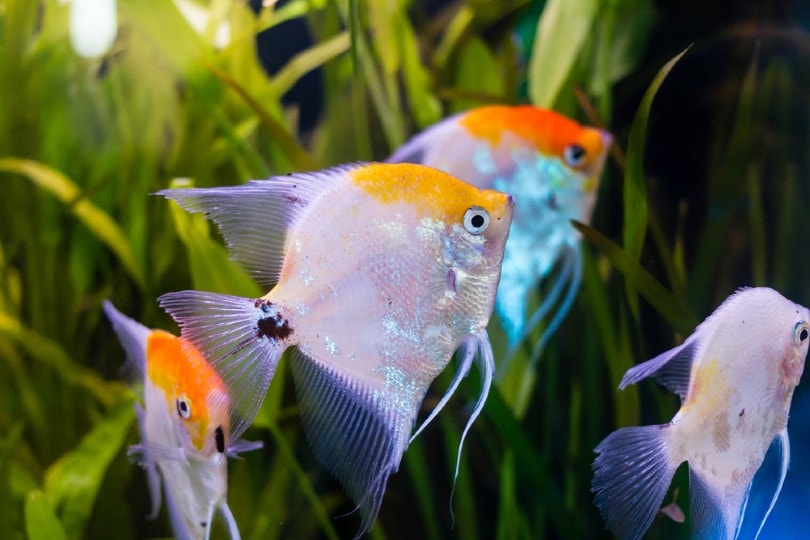
14. Angelfish Do Not Need Aquarium Lighting
Angelfish get natural light that penetrates the water in their wild habitats, so making sure that your angelfish is not being kept in the dark is important. Proper lighting not only looks good for most aquariums, but it can also benefit fish such as the angelfish.
This doesn’t mean that you need a bright aquarium light running throughout the day, but rather a low to moderately bright aquarium light that is kept on for 6 to 10 hours a day.
Lighting is also essential for planted angelfish aquariums as the plants need the light for growth, but make sure to give the tank at least a 7-to-9-hour period of darkness at night for the fish to rest.
Summary
When cared for properly, angelfish can thrive and live for over a decade. By ensuring that your angelfish is kept in a large aquarium with a heater and a good filtration system, you will be able to raise your angelfish for a very long time while enjoying watching your angelfish explore and roam the aquarium.
Featured Image Credit: Supermop, Shutterstock


